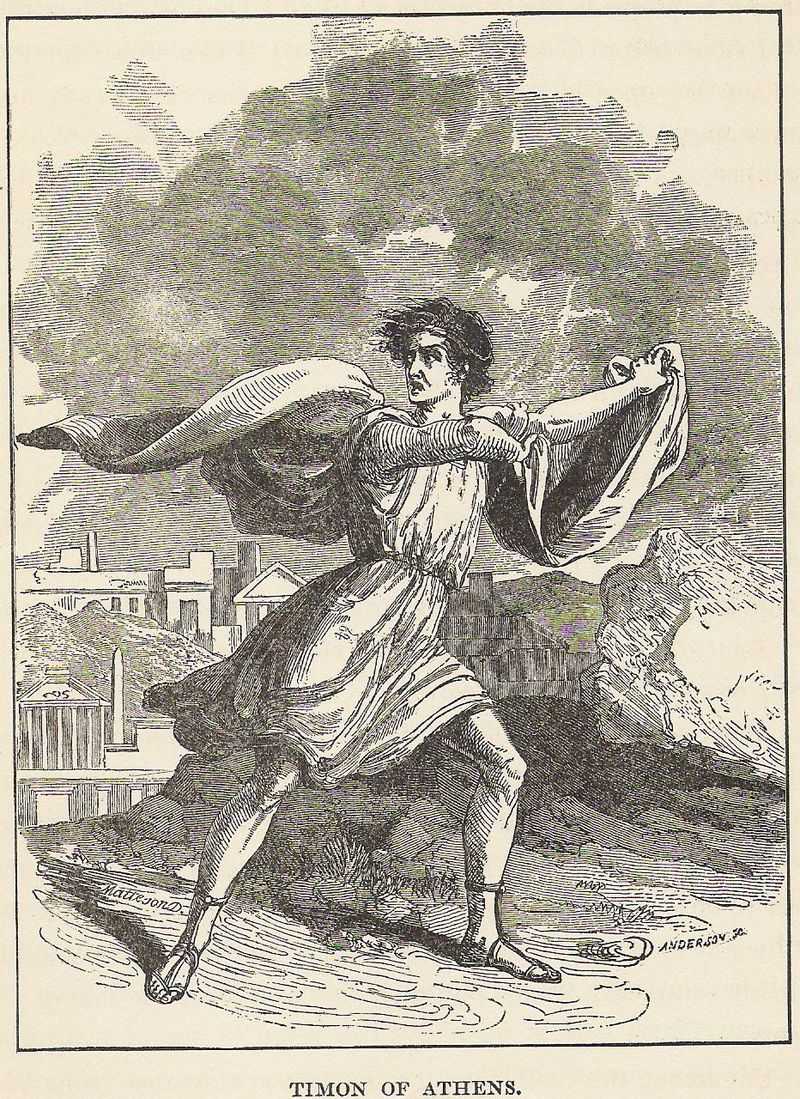Timon of Athens
Timon of Athens (The Life of Tymon of Athens) is a play by William Shakespeare, probably written in collaboration with Thomas Middleton in about 1605–1606, which was published in the First Folio in 1623. It is about the fortunes of an Athenian named Timon (and probably influenced by the philosopher Timon of Phlius). The central character is a beloved citizen of Athens who through tremendous generosity spends his entire fortune on corrupt hangers-on only interested in getting the next payout.
The earliest-known production of the play was in 1674, when Thomas Shadwell wrote an adaptation under the title The History of Timon of Athens, The Man-hater. Multiple other adaptations followed over the next century, by writers such as Thomas Hull, James Love and Richard Cumberland. The straight Shakespearean text was performed at Smock Alley in Dublin in 1761, but adaptations continued to dominate the stage until well into the 20th century.
Timon of Athens was originally grouped with the tragedies, but some scholars name it one of the problem plays.

Date and text
The play's date is uncertain, though its bitter tone links it with Coriolanus and King Lear. John Day's play Humour Out of Breath, published in 1608, contains a reference to "the lord that gave all to his followers, and begged more for himself"—a possible allusion to Timon that would, if valid, support a date of composition before 1608. It has been proposed that Shakespeare himself took the role of the Poet, who has the fifth-largest line count in the play.
The play was entered into the Stationers' Register in 1623. There are no contemporary allusions to the play by which its date of composition may be determined, nor is there an agreed means of explaining the play's "loose ends and inconsistencies". Editors since the twentieth century have sought to remedy these defects through conjectures about Shakespeare's emotional development (Chambers); hypotheses concerning the play's "unfinished state" (Ellis-Fermor) and "scribal interference" (Oliver); and through statistical analyses of vocabulary, stage directions, and so forth.
Assuming the play is a collaboration between Shakespeare and Middleton, its date has been placed in the period 1605–1608, most likely 1606. In his 2004 edition for the Oxford Shakespeare, John Jowett argues the lack of act divisions in the Folio text is an important factor in determining a date. The King's Men only began to use act divisions in their scripts when they occupied the indoor Blackfriars Theatre in August 1608 as their winter playhouse. Timon is notoriously difficult to divide into acts, suggesting to Jowett that it was written at a time when act divisions were of no concern to the writer, hence it must have been written prior to August 1608. A terminus post quem may come from a possible topical allusion to the Gunpowder Plot of November 1605; "those that under hot ardent zeal would set whole realms on fire" (Sc.7.32-33). In the context of the play, the line is referring to religious zeal, but some scholars feel it is a subtle reference to the events of November. The play may also have been influenced by a pamphlet published in June 1605, Two Unnatural and Bloody Murders, which served as the primary source for Thomas Middleton's A Yorkshire Tragedy. This would narrow the possible range of dates to sometime between November 1605 and August 1608. Furthermore, MacDonald P. Jackson's rare-word test found the conjectured Shakespearean parts of the text date to 1605–1606. Going further, Jackson found that if one examines the non-Shakespearean sections in the context of Middleton's career, a date of 1605–1606 also results.












0 comments
Sign in or create a free account